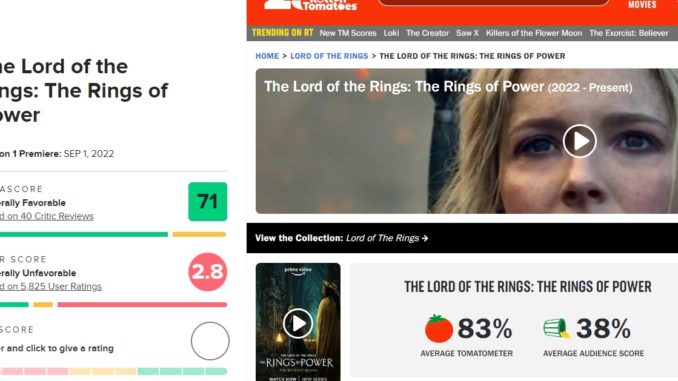
Amazon’s ambitious and expensive venture into J.R.R. Tolkien’s Middle-earth with The Lord of the Rings: The Rings of Power has certainly generated plenty of buzz: both positive and negative. However, with the dust settling on the first season, it’s time to ask the crucial question: is Amazon’s The Lord of the Rings: The Rings of Power a flop? For the ardent fans of The Rings of Power, they would answer that it isn’t as clear-cut as Tolkien fans would claim. Despite the fact that there are signs that the journey to Middle-earth may not be as successful as Amazon hoped.
From the start of Amazon’s The Lord of the Rings: The Rings of Power’s premier, the ecommerce giant immediately started boasting about viewership numbers, breaking its penchant for keeping quiet when it came to metrics. For The Rings of Power, Amazon broke its routine and went on the offensive announcing that episodes 1 and 2 were watched by 25 million global viewers during the first 24 hours. However, quickly after, Amazon then went back to being silent on viewership numbers, causing quite the debate over whether or not the show was a success.
If you listen to fans of The Rings of Power (Faulkiens), they would say it was a success. Or, even worse, “we don’t care about stats or numbers,” facts, common sense, or logic. Obviously, that is a bit of an exaggeration, but there does appear to be a disconnect between Rings of Power fans and fans from shows such as Firefly and Star Trek: The Original Series who were aware of the viewership numbers and would run campaigns to save their shows.
Faulkiens, on the other hand, appear to live in their own bubble and think everything will be perfect. That the Rings of Power will get the full five seasons and that the show is awesome, which is a great example regarding the differences between grassroots fandoms and corporate grown ones.
However, could the Faulkiens be right that The Rings of Power is a success? It is possible.
But is it probable?
Most likely not for a number of reasons.
When it comes to the lifespan of a show, one of the key metrics to consider is viewership. Which is crucial to the success of any show. So asking the question, “is anyone watching Rings of Power” is a relevant one. Reports indicate that only 37% of the domestic audience watched the entire first season of The Rings of Power. Which is an alarming number to see for a new show and which raises an important question: how many of these viewers actually enjoyed the show? After all, viewership doesn’t necessarily equate to satisfaction, and it’s crucial to understand whether or not the series resonated with its audience.
On a global scale, the numbers aren’t much more reassuring. While half of the global audience tuned in, once again we’re left in the dark about how many of them genuinely liked what they saw. Most of the time, successful shows often inspire a passionate fanbase, drive merchandise sales, and leave a lasting cultural impact. The only concrete information we get is from Amazon Studios Head of Global TV Vernon Sanders, who stated that The Rings of Power had 100 million viewers for a total of 24 billion streaming minutes which averages out to 240 minutes per viewer for a show that runs for a total of 9 hours and 17 minutes (557 minutes). If we divided the total number of viewers by half down to 100 million, then the average minutes per person would be 480, still below the total runtime of season 1. Reduced to 42 million viewers, the number would then be 571 minutes of people who might have potentially watched the entire show: an 8% difference from the 50% global audience claim. So one has to wonder what the domestic percentage, if isn’t 37%, considering it has to be far lower than the global percentage.
Proof that not many viewers bothered to watch the entire first season.
And this is where The Rings of Power begins to falter.
Merchandise, or rather the lack thereof, is a significant concern. The absence of a robust merchandise line, similar to what we’ve seen with other beloved franchises like Nu Trek (Star Trek), raises questions about the series’ potential to become a cultural phenomenon. A successful show usually results in a flurry of merchandise, from action figures to clothing, but The Rings of Power has failed to ignite such fervor among fans. Unlike Peter Jackson’s The Lord of the Rings trilogy which had a plethora of merchandise (which went too far with the merchandise).
To be fair, there are likely other factors as to why there was no merchandise for The Rings of Power. Perhaps Amazon didn’t want to pay more for merchandising rights after shelling so much out just for The Lord of the Rings trilogy and its Appendices. Maybe Amazon was waiting to see how well The Rings of Power performed. Whatever the case is, all we know is that a year after season one of The Rings of Power has ended, there remains a lack of merchandise.
Yet, what about a lasting cultural impact? When it came to shows such as Star Trek The Original Series or even Firefly, we saw what a passionate fanbase was able to do in keeping their shows culturally relevant; which is the most crucial element for a show, especially in an era of social media platforms. The Rings of Power is not a water cooler topic when it comes to the general audience nor has it generated a lot of buzz after the show released. It only gains some traction on social media as the Tolkien community and Faulkiens go back and forth over The Rings of Power and where it stands with regards to Tolkien and his work

Then there are the audience scores on platforms such as Rotten Tomatoes and Metacritic which adds another dimension to this cloudy picture that is being painted. On Rotten Tomatoes, The Rings of Power’s audience score is around 3.8 while Metacritic’s audience score is even lower at 2.8 while IMDB has a 6.9 rating. However, in regards to IMDB, which is owned by Amazon, we know that the company curated the audience score and suspended audience reviews for the first 72 hours of the show’s premiere. The allegations of Amazon manipulating the audience score when the show first released further erodes trust in the metrics when it comes to IMDB and casts doubt on the authenticity of any positive ratings, making it difficult to gauge the true sentiment of viewers.
However, Amazon muddied those waters before the show was even released.
From the start, Amazon went on the offensive with a campaign blitz to try and convince the Tolkien community that The Rings of Power was going to be great. It was going to be epic. Unfortunately the trailers, the “reactions,” and ads failed to convince Tolkien fans who began to criticize what they were being shown and what they were learning about the show. Trailer videos were ratio’d, Cringe promo videos hidden, “superfan” reaction videos were hidden that were mocked, and the Tolkien community soured from the constant barrage of vitriol and demonization as ROP showrunners talked about their show and talked down to the fanbase as if they were idiots, racists, and sexists.
Yet, while Amazon tries to spin the bad audience reviews as racists and trolls who are “patently evil” and attempting to sabotage The Rings of Power, that is not the case. The show’s bad writing is the major contributing factor for its poor reception and why Tolkien fans are upset about The Rings of Power. Bad writing is what led to the show’s slow pacing, unwillingness and inability to adhere to canon, changing established characters to unrecognizable abominations, and more which resulted in the low audience scores.
So we have a low percentage (37%) of people who watched the entire season and a low audience score that could be used to draw a conclusion. That only a minority of a minority of viewers actually enjoyed the show.
Does that make sense?
Perhaps the most concerning aspect is Amazon’s claim that “The Rings of Power” is a success due to increased Prime memberships and that the show reached a global audience of 100 million. Given Amazon’s established pattern of exaggeration and manipulation when it comes to the show’s performance, it’s hard to take their word at face value. Let’s not forget that, in 2022, Amazon also purchased MGM which has a huge library of entertainment that would be an enticing reason for consumers to get a Prime membership.
So are these new memberships truly a result of the series’ popularity, or is it a strategy to protect their substantial investment? The latter, rather than the former, is the most likely explanation when it comes to new memberships.
Another telling indicator is the response from industry peers and awards shows. While fan opinions can be divisive, critical acclaim and recognition from the industry often indicate a show’s overall quality. So far, The Rings of Power has failed to impress even its peers, only being nominated for Main Title Design, Original Main Title Theme Music, Sound Editing, Prosthetics, Special Visual Effects, and Costumes – raising concerns about its long-term prospects.
How unsurprising.
No nominations for writing or acting despite Faulkiens saying that the show is awesome.
With all these factors taken into account, is Amazon worried about The Lord of the Rings: The Rings of Power? It certainly seems so and while some will think labeling The Lord of the Rings: The Rings of Power a flop may be premature, there are undeniable signs of trouble on the horizon. From questionable viewership statistics to the lack of merchandise and skepticism around audience scores with the company quickly confirming that there would be a season 2, the series has a long way to go to prove its worth. Amazon’s credibility, already marred by allegations of manipulation, only adds to the uncertainty surrounding the show’s success. As Tolkien fans and Faulkiens alike await the second season, the fate of this ambitious project remains uncertain.
But given how much Amazon has invested in The Rings of Power. The company might just stick it out no matter how much of a flop it is and how much worse it can get for the show. So yes, The Rings of Power is a flop, but it is a flop that might get its full five season run.
Update: Since this editorial was written, Amazon has further delayed Season 2 of The Rings of Power with no release date in sight, Rings of Power Season 3 will have a reduced budget, and that Amazon was testing the waters with fans over the alleged casting of Gavi Singh Chera as Sauron.
Author’s Note: Support this site by donating via Paypal or even checking out our merchandise on RedBubble where you can find designs that cater to writers and readers. Money donated and raised goes into paying for this website and equipment.




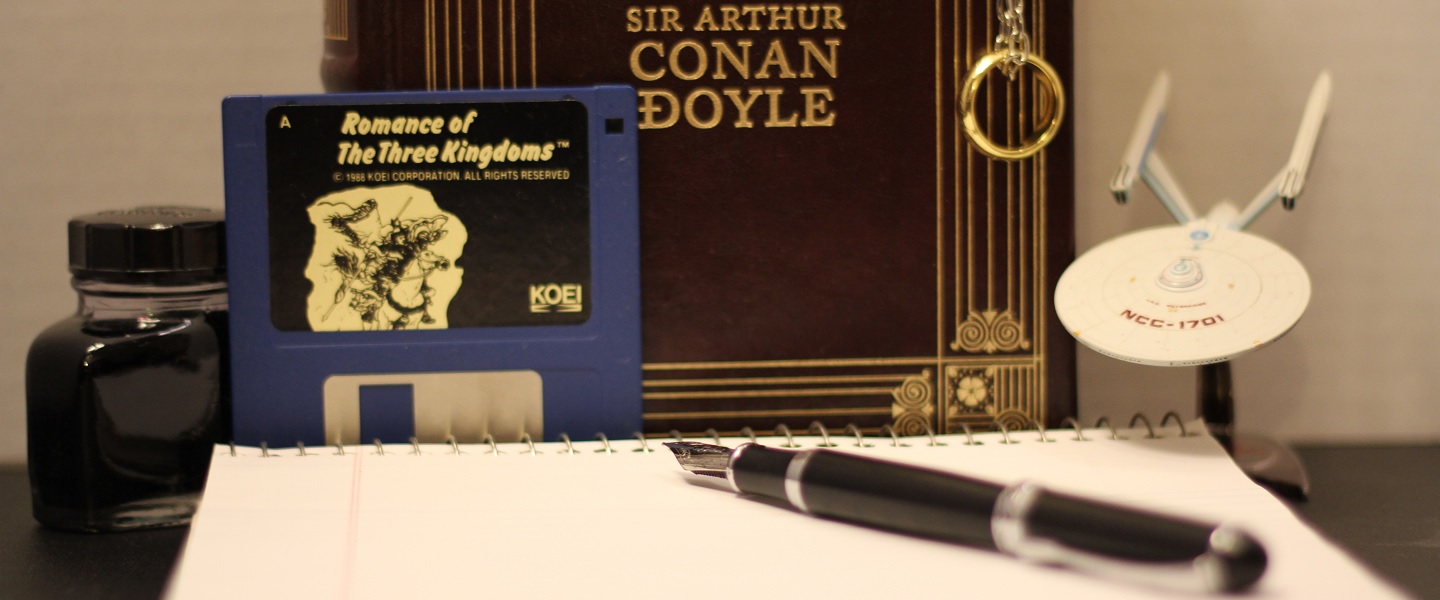

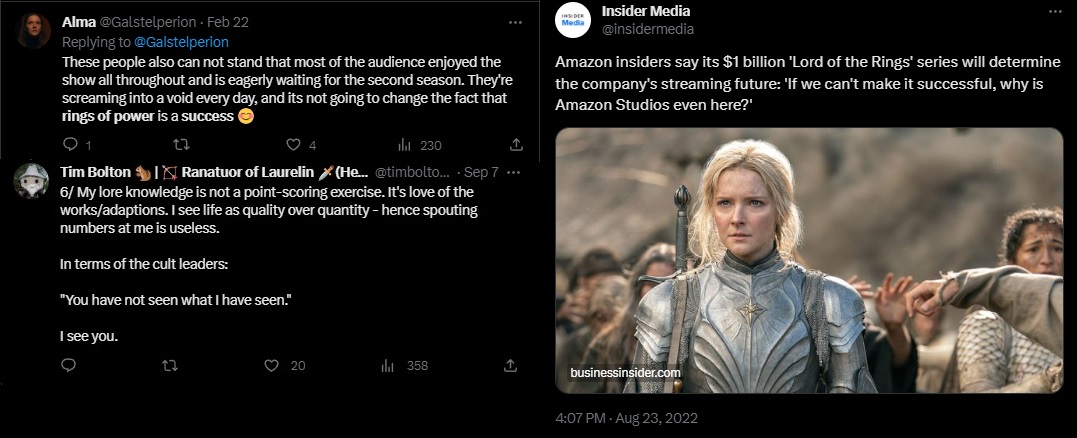

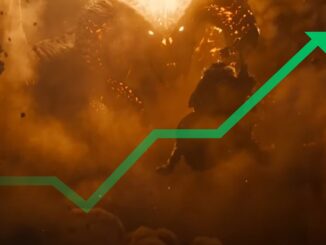
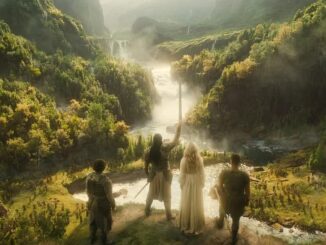

[…] watch season 1 of The Rings of Power; despite what ROP fans say to the contrary. Even then, for the 37% of people who watched season 1, the S2 trailer treats them like idiots with its opening […]
[…] fact that they didn’t have access to the books which dealt with the Second Age resulting in a show that is a flop and loathed by the majority of […]
[…] Yet, as the truth started to shine through the dark clouds of Amazon’s obfuscation, the shift finally started to happen. The minority of bullies, these Faulkiens, who gleefully attacked anyone who criticized The Rings of Power started to dig and slither into their own little holes. Like Gollum who no longer had love for the light, they tried to hide themselves deep in the bowels of the mountain when they realized how poorly received the show actually had been. […]
[…] portion of Tolkien fans who have been burned, especially when it comes to The Rings of Power which general audiences also didn’t care for. Then there is Héra being the main character for the movie and an audience tired of female-led […]
[…] provided an experience that is ponderous, boring, and unenjoyable for the majority. The result? A 37% retention rate of viewers for a show that has no merchandise and a lackluster reception for Season […]
[…] and watch time, 37% retention rate domestically and 50% globally, it was easy to surmise that Rings of Power was a flop for Amazon. Especially given the exorbitant amount of money spent on the show, $1 billion, and how much […]
[…] in September 2022. At that time, the company was quick to announce that the Season 1 premiere had 25 million global viewers within the first 24 hours of […]
[…] However, no specific numbers were provided by the account. As for Amazon, the company announced that The Rings of Power Season 2 saw 40 million global viewers within 11 days. Another potentially large drop in global views when compared to Season 1 where Amazon declared that 25 million global viewers tuned in during the first 24 hours. Amazon hasn’t released any further details prompting debate on whether or not the company is obfuscating when it comes to the show’s statistics. But the prevailing trend is that The Rings of Power Season 2 is underperforming significantly compared to Season 1 and given further credence to assumptions that the show is a flop. […]
[…] determining whether or not The Rings of Power Season 1 was objectively a flop, we had to utilize what little information Amazon had provided to us. According to Amazon, Season 1 […]
[…] The Lord of the Rings: The Rings of Power continues to anger Tolkien fans, bore and bewilder the general audience, while simultaneously catering to a minority of Faulkiens (faux Tolkien fans). The show’s writing […]
[…] why we see so many movies and tv show adaptations failing such as The Witcher, The Woman King, Amazon’s The Lord of the Rings: The Rings of Power, and so many other IPs where the writers behind it had that same, exact mentality. That they needed […]
[…] confirmed. Amazon’s focus on global viewership numbers is not surprising given how domestic views for The Rings of Power Season 1 were at 37% who watched the entire season compared to 50% global viewer […]
[…] When broken down, the 100 million global viewers and 24 billion minutes watched statistics mostly fell in line with previous reports that there was a 37% domestic retention rate and 50% global viewer retention rate of who watched the entirety of The Rings of Power Season 1. Which brought up the question of whether or not The Rings of Power Season 1 was a flop for Amazon. […]
[…] can see how season 1 of The Rings of Power has turned out. You know, little facts like only 37% of viewers bothered to watch the show in its entirety, lack of merchandise, lack of awards, and how quickly it was forgotten by the […]